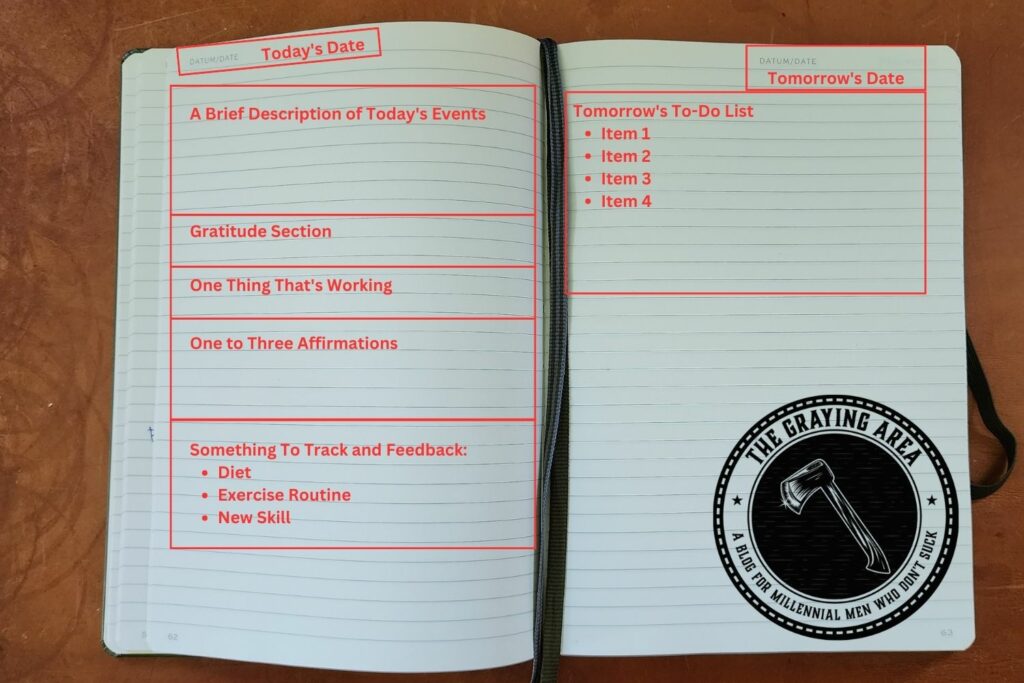Journaling For Men: Why and How To Start This Incredible Habit
I won’t lie to you guys. I felt a huge barrier before I started journaling. If someone would mention journaling, it felt like something only little girls in 1990s Disney TV shows did. But, at the time, I was struggling with direction and I needed something to get me on track. So, I grabbed a notebook off the shelf, grabbed my favorite pen, and got to work.
I immediately felt the difference. I made journaling part of my routine, and it helped me be productive, more focused, more compassionate, and more aware of how I was showing up in the world. I’ve been a believer in journaling for men ever since.
But what does it mean? What is journaling and how does it work? And why is it such a big deal? I’ll answer all that and more in this guide on journaling for me.
Note: This post may contain affiliate links. If you click on a link and make a purchase, TGA may make a small commission.


The Best Hand Tools List for Guys: 25 Must-Have Pieces
Being able to build something or repair the things that surround you every day is one of the greatest skills a guy can have. It’s a skill that is not only helpful but will also save you money. Instead of calling the repair guy, you can grab your toolbox and get to work. But you…
What is Journaling for Men?
Journaling is writing thoughts, dreams, worries, fears, goals, gratitudes, and affirmations on paper consistently. It’s a way for men to keep track of their thoughts, map their futures, manage their emotions, get the creative juices flowing, and maintain motivation and focus. Essentially, you write in a notebook once a day to not only get your thoughts flowing but also increase your creativity and deal with any challenges you might be facing.
There are a lot of misconceptions about journaling. How do I know? Because I had some myself.
When I decided to start journaling, I struggled with the concept of keeping a journal versus keeping a diary. A diary felt feminine, silly, and like a waste of time. Let’s face it, I wasn’t going to be writing “Dear Diary, Billy looked so cute today.” That’s not what I was in it for.
But written journals and diaries are very different. Diaries are ways of simply writing down the events and all the details of the day, and that by itself felt juvenile. However, a journal is a notebook in which a man can write down everything. He can record his feelings, struggles, goals, and to-do lists, and just let the words flow. It’s a completely different experience than writing in a diary, and it’s definitely worth the effort.

How Journaling for Men Works
I already know that getting into journaling can feel intimidating, but I’m going to lower the barrier to entry as much as possible by explaining how to start journaling. We’ll take it step by step.
Step 1: Find a Journal and Pen
Start by finding a high-quality journal. You’ll be picking this thing up several times a day for around 3 months (as long as my journals usually last). You owe it to yourself to actually enjoy the journal you’re picking up. My current favorite after moving from a hard-covered, standard-lined notebook is the Leuchtturm 1917 ruled journal (available on Amazon).
On the other hand, if things are tight, a spiral-bound notebook will do the trick to get you started.
Also, find a great pen (ball point is fine, but if you’re interested in fountain pens, I have you covered there too). It should be comfortable in hand, write well, feel balanced, and be easy to keep track of. I have a pen that we got as a bonus item from an online order, and I won’t give it up. I actually bought ink refills that I can replace to keep it going.
You can usually find a way to keep your pen and journal together, whether it’s through the elastic loop that holds most journals closed or sliding it inside a cover. Just be sure to keep them together to ensure that the journaling process goes smoother than most other new habits you’ve tried taking on.
Step 2: Find a Time
For journaling to be effective, you’re going to want to journal at least once each day (you can write in yours as often as you’d like). The best way to ensure this happens is by choosing a time for your journaling schedule.
If you’d like, set a timer for the same time every single day. This timer will keep you putting pen to paper and writing in your journal. For me, I like to journal at the end of the day, right before bed. You’ll see why in a bit when I explain what to write in your journal. Just remember that this is a new habit and if you miss a day because you forgot, start again tomorrow.
Step 3: Start Writing
This is the hardest part, but you need to just start writing. My first entry said something to the effect that “This is my first journal entry, and I don’t really know what I’m doing.” Start slow and cut yourself some slack. Record all your thoughts and see where it takes you.

The Benefits of Journaling for Men
There are numerous benefits of journaling. These can range from keeping us sharp mentally, processing our emotions, and holding ourselves accountable. The following are some of the biggest impacts that a journaling habit can offer.
Accountability, Goal Setting, and Progress
If you struggle with holding yourself accountable, journaling will help. The act of writing down your plans is like setting expectations for yourself, and the dopamine rush you get from checking items off your list or accomplishing things you set out to do will keep you accountable.
You may also feel a push to set bigger goals for yourself and then track your progress as you work toward them—whether it’s learning a new skill or trying a new workout routine. Knowing what your goals are and then recognizing what’s working and what isn’t will help keep things on track.
Improved Mental Health
I can point you to thousands of articles on the mental benefits of journaling on well-being, and those articles will then point you to the same 30 studies on the impact of journaling on mental health. The reality is that journaling helps manage stress, which is a major factor in our mental health. But also, according to camh.ca, above-average stress levels and the inability to cope with them can lead to developing clinical mental health issues, such as anxiety, depression, or addiction.
Organization
Pen-to-paper journaling can create physical representations of your thoughts and feelings. By recording thoughts, you may be able to determine which items on your to-do list are most important, which goals are most obtainable, or just generally plan your next step in your professional or family life.


30 Badass Skills To Learn in 2024
Most self-improvement stuff sucks. But, as men, we should focus on bettering ourselves, especially as we age (that’s what we’re all about here at The Graying Area). While we’re all awesome in our own way, instead of sitting around an playing video games, there’s always room for new badass skills to learn to help broaden…
Self Improvement
Journaling is often associated with self-improvement, and it’s for good reason. As one starts documenting their life, they’re able to identify areas where they’re unhappy. If they aren’t showing up how they’d like to at home, an honest look at their journal helps point that out. Also, if they’re feeling lazy or unmotivated, or they’re having issues with interpersonal relationships, they’ll probably write about it.
Once they identify where they’re falling short, they can move on a path to self-improvement. And, if they’re using the formula outlined below, they can track their progress.
Stress Management
While we mentioned stress management in mental health above, there are other benefits to stress management as well. Since journaling is proven to reduce the impact of stress on the body, a regular journaler may improve their immune system and physical health over time. Just like meditation, journaling can help the body build resilience to stress.
Improved Sleep
Guys who get in the habit of journaling before bed will find they sleep better. Regardless of what they journal about or how awful their day was, journaling right before bed provides some wind-down time away from blue light produced by TVs, computers, and mobile devices. If consistently adhered to, journaling can also begin to trigger the body’s sleep cycle, allowing men to fall asleep faster and achieve better quality sleep (note: this same study does contradict my To-Do list process, which you’ll learn later, but I find disorganization more worrisome).
Improved Memory
Research shows that writing things down is an effective way of activating cognition. It’s more effective than committing thoughts to memory alone, and including journaling in their daily routine will help men with working memory muscles and remembering goals, thoughts, and ideas as well as responsibilities and items on their To-Do lists.

Famous Men Who Would Keep a Journal
Keeping a journal isn’t just something that men have discovered. Many of history’s greatest thinkers, authors, artists, and made the journaling practice an important part of their daily life. Even some of today’s most influential men journal. The following are some of the most significant habitual journalers.
- Thomas Jefferson
- Lewis and Clark
- Andrew Carnegie
- Captain Cook
- Winston Churchill
- Theodore Roosevelt
- George Lucas
- Leonardo DaVinci
- Mark Twain
- Henry David Thoreau
- Charles Darwin
- Albert Einstein
- John Adams
- David Bowie
- Ralph Waldo Emerson
In many cases, these men’s journals provided valuable insight for future generations (that’s why I believe journaling is one thing every man should do before they die). We got to know these great men, how they saw the world, some of their unwritten stories, the ways they thought, and how they navigated through the challenges of life through their habit of keeping a physical journal. Just imagine if you could read the stories your great grandpa wrote in the journal he kept! If you have, let me know in the comments below.

What to Journal About
If you’re able to just start writing freely about whatever comes to mind, then you don’t really need this section. But, part of the biggest challenges about journaling for men is knowing what to write. While you should find a technique that suits you, I came up with what I believe to be the perfect formula, but you can tweak this as needed.
Note: Sections 1 through 6 are on the left page while 7 and 8 are on the right page. This is for a reason, and I’ll point out why in a bit.

Section 1: Today’s Date
I write my journal entries at night (even sometimes after midnight), so I date them for the day that just finished. So, if it’s Thursday at 11:30 PM, I’ll give it Thursday’s date. If it’s Friday at 1:00 AM, I’ll still give it Thursday’s date. I’m a night owl, and this is what I’ve found is the most helpful for me.
Section 2: Today’s Events
The first thing I write about is the events of the day. Only the major ones, but those that highlight the day. For me, this paragraph is often about my wife and the children, baseball, or something we did explicitly that day. If anything annoyed me, made me happy, caused negative thoughts or bolstered a positive mindset, I would write it down.
Section 3: Something That I’m Grateful For
Showing gratitude is a powerful tool, and I believe in harnessing it when I journal. This section would almost always include my wife or children, but it can also be gratitude for having a job, your health, or your upcoming vacation… It doesn’t matter. As long as you’re showing gratitude for something, write it down.
Section 4: Something I Did Today That Worked
Some days are rougher than others, and on those rough days, it’s nice to have a built-in process that requires you to give yourself credit. I like to write down one thing that I did or that I’m doing that I know is making a difference. I’ll usually write one sentence about something I’m doing professionally here.
Section 5: Affirmations
I was never a believer in affirmations. But, after struggling to feel good about myself and my role in my family after a very slow month at work, I started mixing affirmations in. This became one of my favorite sections to write not long after.Typically, I write two to three affirmations. One is about my role as a father and husband, and the other one or two is about what I’m doing as a business owner. I’ll go over affirmations in a future article, but every man should make affirmations a journaling habit.
Section 6: Something You Need to Track
The last section on the left page is where I track my progress with certain activities. For example, right now, I’m tracking my process of intermittent fasting. I discuss the day, how well I did, and how many days in a row it’s been. For other guys, this section could be your exercise routine progress, your 5K time, and many other things. This section is really about using your journal to stay accountable and track how far you’ve come.
Section 7: Tomorrow’s Day
On the top of the page on the right, I’m going to mark down tomorrow’s date. This is to stay on track and keep organized.
Section 8: My To-Do List
The final section I’ll be writing is my To-Do list. I’ll write down everything I have to do when I wake up until I go to sleep. I’ll write down articles that I have to write, edits I have to make, which games or practices I have to coach, the exercises that I have to do, and the miscellaneous stuff like getting my truck inspected or running to the bank.
Why So Systematic?
There are very specific reasons why I’m so systematic about my journal entries.
For one, when I’m struggling with what to write, having different sections takes the pressure off of really nailing any expressive writing or detail. Sometimes my recap will be detailed while other days my section of what’s working will contain a great idea I had and need to flesh out. I’m able to fill out every section to some degree despite maybe dealing with some feelings or blocks.
Second, there’s a reason I write my entry on the left page and tomorrow’s To-Do list on the right page. It’s because I’m going to go to the To-Do list several times throughout the day, and in the process, I’ll see what I wrote the previous day. I can reread what I wrote and feel good about where I’m at or realign my day and take it in a different direction. For guys who struggle to keep a journal, this can be a game changer.

Other Types of Journals for Men
My method isn’t the only way to journal. There are other journaling styles for recording thoughts, goals, stresses, and plans in the written word. The following are some other common types of journals men can explore.
One-Sentence Journaling
You just write one line for each day of the month. This is a great way to start a daily journaling habit without a huge time commitment.
Gratitude Journal
This is a paper journal in which you can record and reflect on one, two, or three things you’re thankful for each day.
Bullet Journaling
For a really low barrier-to-entry approach to keeping a journal, try bullet journaling. It’s essentially like making a list each day of things that happened to you, a goal tracker, or a to-do list for tomorrow. This is a super focus-driven method of journaling, allowing users to write only what matters when it matters.
Morning Pages
Morning pages are a brain dump-type journaling habit. With this method, guys can sit down and write three pages of whatever comes to their minds. These three pages don’t have to be coherent, and guys don’t even need to refer back to them. The point is just to write.


The Ultimate Golden Fox Boots Review for 2024
Considering buying a pair from the lesser-known brand Golden Fox? Don’t spend a dime until you read this Golden Fox boots review. You might be surprised. I have a long history with boots, especially when I was a contractor/handyman. Typically, I wear through at least a pair a year since I was 14 years old….
5 Ws Journal
Recording the who, what, when, where, and why of what occurred throughout the day. The Why can be particularly insightful.
Double-Entry Journal
A double-entry journal is the process of writing down the day’s events on the left page and then recording your thoughts or responses to those events on the right page.
Idea Journal
As it sounds, an idea journal is just a handy way to write ideas down before they slip your mind.
Google Doc Journaling
If you don’t want to keep a paper journal, you can try starting one long-running doc, or several small journal entries through a Google Doc. It can use the same concept as any of the journaling methods above, as well.
Your Thoughts
Do you want to know more about journaling and how you can make it work in your life? I’ll be working on some future content about the different types of journaling and some of the best journals guys can shop for. If you have anything to add, let me know in the comments below. I always appreciate hearing from you guys and the only way to know if you enjoy these articles is your feedback. And don’t forget to join the mailing list so you don’t have to worry about missing any of this content that could help you build a better life for yourself and your family.

Enjoying learning about badass skills? What about reviews on products men actually use? Or just generally learning how to be a more useful man? THEN JOIN THE TGA MAILING LIST! Weekly content sent directly to your email address so you don’t miss any of the fresh content and useful advice we’re producing. Sign up below!






